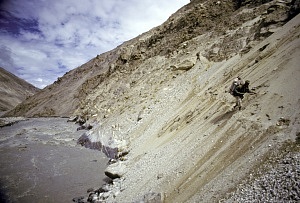
One slip and it’s a watery grave in the raging tributary to the Indus.
Passion is such an overused word but I don’t know a photographer who is not passionate about what they do. They are certainly not doing it to get rich!
Anyone in a creative field needs that passion to excel whether they are writers, painters, cooks, winemakers or photographers. They are far easier ways to make a much better living but it all comes down to how you want to spend your life.
I read an interesting take on passion by the Swiss chef Daniel Humm. When he says he has a passion for food and a passion for cooking his use of the word “passion” refers to the German word: leidedschaft which approximately means “enjoy suffering”
“That would be my translation,” he says. “Passion is not something pleasant. Are you willing to suffer for this? That’s when you have passion. Otherwise, it’s a hobby. Passion is not a hobby.”
Along with movie star, travel photographer always used to rank as one of the most desirable dream jobs. Friends saw me jetting off to exotic destinations every month and even my mother back in England would always say “Have a nice holiday.” If only they knew.
Bridges of Madison County didn’t help the image of a travel photographer. Getting paid to travel the world, staying in luxury hotels and dining in 3 star Michelin restaurants every night, not to mention all those women throwing themselves at you had a certain appeal – if only it was true.
This is the reality. Magazines used to spend a lot of money in airfares, hotels, meals etc. to send you to cover a destination and you were expected to come back with the goods. No excuses. This puts a tremendous amount of pressure on you. I remember spending the month of June in Paris shooting for Bill Gates with an almost unlimited expense account and I would be out before sunrise at 5 AM and often not finish shooting until after sunset. One night I was still shooting Notre Dame at 11 at night and there was still light in the sky. I went out of my way not to screw up. No time for fun.
National Geographic assignments were the same. You know if you screw up it could be the last time you work for them and it’s a surprisingly small world and the word soon gets out.
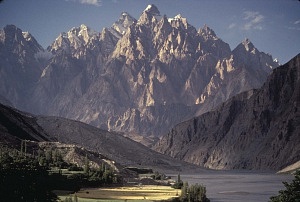
The Karakoram Highway had only been open for a few weeks. Talk about a scenic highway!
The first job I did for Geographic was in Northern Pakistan. I spent 4 months in the Karakoram Mountains living in a tent. This was a typical protein filled lunch and yes, I did eat it!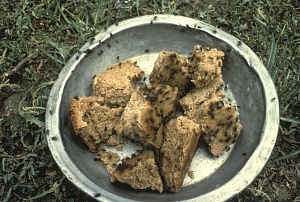
The terrain was exceptionally dangerous and I was caught between two feuding villages about 3 days apart. Hispar, a village with a notoriously volatile population of under 500 clinging to the edge of civilization, was where I had to hire porters. A couple of years previously the whole village had been put on probation for abandoning a Japanese climbing expedition and stealing all their equipment. The hike into Hispar had taken 3 days and I had continued along the Hispar Glacier to the Hispar Pass at 17,000 ft., several days past the village. On my way back I came down with amoebic dysentery and collapsed back at the village. I had to stay in a hut on the outskirts of the village as non-muslims had never been allowed in. My friend, photographer Galen Rowell, had tried to get into the village several times and never been able to. After a few days, for some reason, the villagers relented and allowed me to walk around their village but first made sure all the women were inside. I developed a close relationship with many of the men and being able to assimilate is one of the secrets of being a successful travel photographer. But then things went horribly wrong.
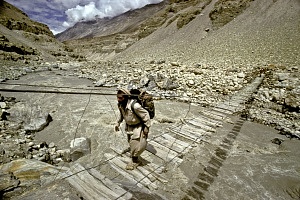
The final bridge across the melt waters from the Hispar Glacier. And you think our roads are bad!
An ongoing feud escalated between the people of Hispar and the people of Nagar the next closest village with which there was no road access. A porter was sent from Nagar to “rescue” me and get me out of there. A young Nagari, Ali Haider, had accompanied me on several treks through the mountains and now he was thrown into this volatile situation. We were immediately put under house arrest on the edge of the village with a guard posted to keep his eye on us. I now felt like a traitor to these former friends and the last thing I wanted was to get caught in the middle of this.
It was Ramadan and we knew that as soon as the sun set everyone would rush inside to eat. That included our guard. We surreptitiously packed our gear ready for a quick escape. The time came and we hit the road as quietly and quickly as possible. Not quietly enough. Someone in the village heard us and soon a small posse of villagers was chasing after us. They reached us before we got to a major river crossing and started to physically attack young Ali. They ignored me but I jumped in swinging my ice axe and they retreated from this crazy foreigner and went back to the village to gather reinforcements. These were guys that wouldn’t think twice about throwing you into the raging river a couple of hundred feet below us.
It was now dark and we traveled without lights along the mountain trail that had taken us 3 full days to negotiate on the way in. It was a moonless night and the only light was from the stars. Soon we could hear a gang of people coming along the path after us and occasionally see their lights in the distance. I have never moved so fast in my life. We sped across almost non-existent trails and around midnight Ali went off the path to a hidden shelter he knew high on the mountainside. I was still weak from the dysentery and needed to rest. We could hear them for at least another hour and then everything went quiet. I didn’t sleep a wink that night and kept hearing imaginary sounds of lynch squads coming to get us.
We set off again before dawn and arrived back in Nagar in just under 24 hours!
Admittedly this wasn’t a normal assignment but even the most benign journeys can have their problems
A couple of years ago I was in Laos traveling close to the Chinese border. I wanted to photograph some of the remote hill tribes and the more inaccessible the better. We started in Luang Numpta, a nondescript village where the bone rattling bus from Luang Prabang deposits everyone after a nauseating 12-hour drive. The morning before we left for the mountains we had to stock up on provisions and walked over to the local market along muddy and potholed streets. I always carry a camera with me and my Nikon D4 was swinging over my shoulder. I jumped a particularly evil looking mud patch, my foot caught the far side of it, both my feet shot out from under me and I fell flat on my back in the mud hitting the back of my head in the process. The embarrassment and pain were the least of my problems. My Nikon with a 24-70 f2.8 lens attached smashed onto the ground snapping the lens off the camera body leaving me one body and an ultra wide angle zoom. I had to adapt.
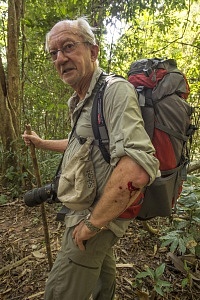 The trek into the village was steep, hot, humid and long. I wasn’t feeling the greatest after my fall and a heavy backpack was the last thing I needed to carry. I struggled up the mountainside barely being able to keep my balance. In fact I didn’t keep my balance and took a couple of nasty tumbles. Nevertheless, for me the photographs always justify the suffering.
The trek into the village was steep, hot, humid and long. I wasn’t feeling the greatest after my fall and a heavy backpack was the last thing I needed to carry. I struggled up the mountainside barely being able to keep my balance. In fact I didn’t keep my balance and took a couple of nasty tumbles. Nevertheless, for me the photographs always justify the suffering.
I would return in a heartbeat. I’ve always found the most satisfying journeys have been the most difficult. I enjoy a challenge.
The real challenge is looking objectively at the photographs later. We tend to remember the whole experience and the difficulty in getting the shot. It can cloud our view. Just because they were difficult to get doesn’t make them great photographs. Nobody else knows what you went through to get them. Stand back and ask yourself if the shots were really that good
Photo ©Andrea Johnson
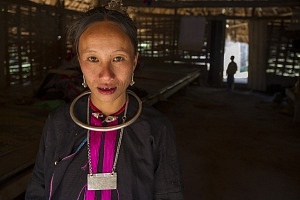
One of the hill tribe women in her finest outfit.
